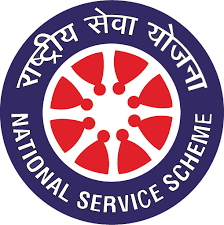National Service Scheme
The programme aims to instil the idea of social welfare in students, and to provide service to society without bias. NSS volunteers work to ensure that everyone who is needy gets help to enhance their standard of living and lead a life of dignity. In doing so, volunteers learn from people in villages how to lead a good life despite a scarcity of resources. The volunteers also provide help in natural and man-made disasters by providing food, clothing and first aid to the disaster's victims.
Today NSS has about 3.86 million student youth enrolled in 41,442 NSS units spread over 396 Universities/ +2 Councils, 16,331 Colleges/ Technical Institutions and 28,621 Senior Secondary Schools across the country.
NSS Motto:
The Motto of NSS "Not Me But You", reflects the essence of democratic living and upholds the need for self-less service.
NSS Logo:

The symbol of the National Service Scheme is based on the Rath wheel that is present at the Konark Sun Temple in Odisha. The navy-blue color on the badge indicates that the NSS will contribute its share towards the welfare of mankind and the red color signifies that the NSS volunteers are full of high spirit and are energetic, active, and lively. The symbol thus stands for continuity as well as change and implies the continuous striving of NSS for social change.
NSS Day:
National Service Scheme, popularly known as NSS, was formally launched on 24th September, 1969, the birth centenary of the Father of the Nation.
Objectives of NSS are:
- To understand the community in which they work.
- To understand themselves in relation to their community.
- To identify the needs and problems of the community and involve them in problem-solving.
- To develop among them a sense of social and civic responsibility.
- To utilize their knowledge in finding practice solutions to individual and community problems.
- To develop competence required for group-living and sharing of responsibilities.
- To gain skills in mobilizing community participation.
- To acquire leadership qualities and democratic attitudes
- To develop capacity to meet emergencies and natural disasters.
- To practice national integration and social harmony
